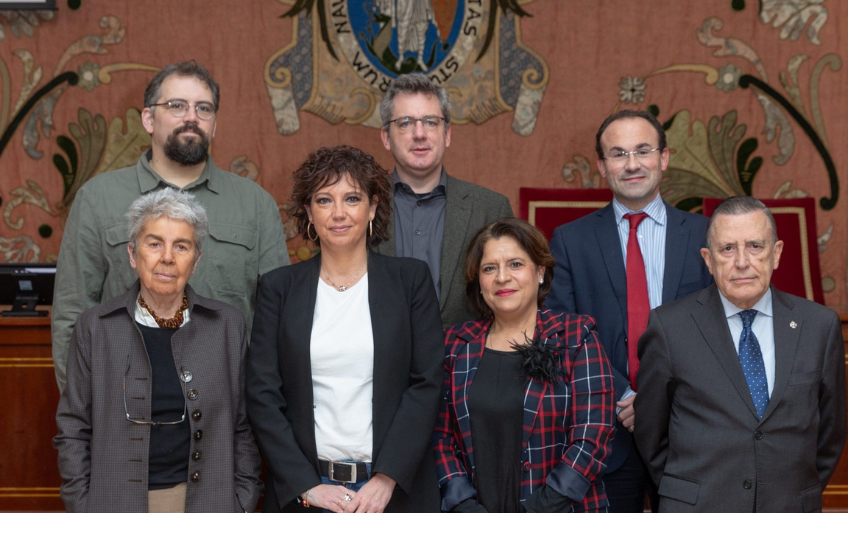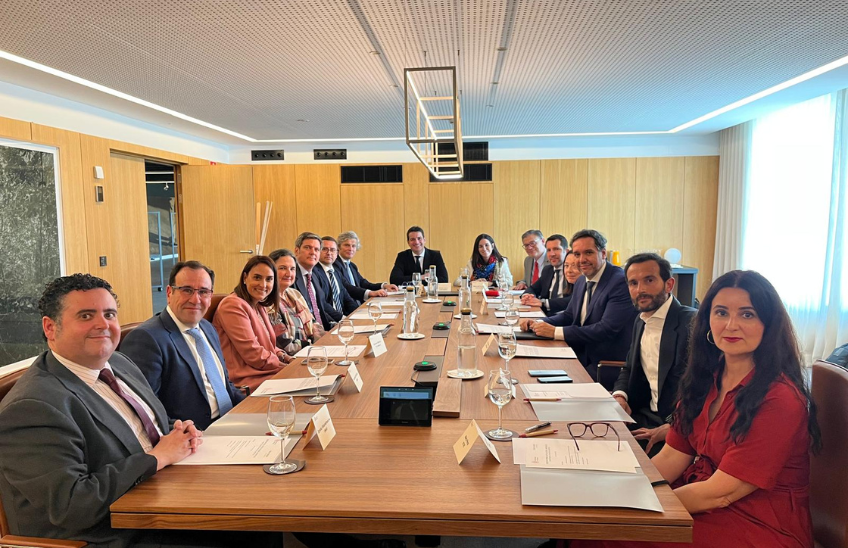Chantal Delsol, Professor at the University of Paris: "Free citizen initiative contributes to the common good, and the State must take care of it".
The University of Navarra hosted the XXIII workshop of the classroom of Parliamentary Law, organized by the School of Law and the Cámara Foral, focused on the principle of subsidiarity of the State.

PhotoManuelCastells/From left to right, in the front row, Chantal Delsol, professor at the University of Paris; Ainhoa Unzu, vice-president of the Parliament of Navarra; Asunción de la Iglesia, professor at the University of Navarra and director of classroom de Derecho Parlamentario; and José Luis Martínez López-Muñiz, Full Professor emeritus of the University of Valladolid. Behind, Pablo Ortúzar, professor at the Catholic University of Chile; Nick Barber, Full Professor of the University of Oxford and Fernando Simón, professor at the University of Navarra.
27 | 11 | 2023
"The State must encourage initiatives aimed at the general interest; support them financially; ensure that they use public funds prudently; and, finally, in case of insufficiency, make up for them". This was stated by Professor Chantal Delsol, professor emeritus of Philosophy Politics at the University of Paris and president emeritus of the Academy of Moral and Political Sciences of France, at the XXIII international workshop of classroom of Parliamentary Law held recently at the University of Navarra. The classroom is the result of a agreement between the academic center and the Parliament of Navarra. The workshop was inaugurated by the vice-president of the Parliament of Navarre, Ainhoa Unzu, who valued the creation of these spaces for dialogue and discussion.
As Chantal Delsol explained in her speech, "man is not only an autonomous person and manager of himself, but also a member of communities and society in general. And civil society cannot allow anyone to be deprived of what is essential to its development. Thus, the problems raised by the application of the principle of subsidiarity are the following: where is the level of the common good and who decides about it?". The French philosopher answered these questions and positively valued the autonomous action of citizens and intermediate groups. "It could be said that the principle of subsidiarity destatizes the common good. In other words, it refuses to nationalize politics: every citizen, every legal person, can become an actor in the general interest. In all fields (Education, health, culture, attendance, etc.), legal entities (associations, foundations, private institutions) or non-state public bodies carry out missions of general interest with financial aid negative (exemption tax) or positive (subsidies)."
The workshop continued with a roundtable, moderated by the professor of Constitutional Law of the University of Navarra, Fernando Simón, with the participation of Nick Barber, Full Professor of Constitutional Law of the University of Oxford, who explained the relationship between the concepts of subsidiarity, sovereignty and democracy; Pablo Ortúzar, researcher of the Catholic University of Chile, who focused on the historical origins of the principle of subsidiarity; and Cristóbal Aguilera Medina, professor at the Finis Terrae University of Chile, who spoke on the principle of subsidiarity in the field of Education.
position The closing lecture was given by José Luis Martínez López-Muñiz, Full Professor Emeritus of Administrative Law at the University of Valladolid, who analyzed the principle of subsidiarity in the European Union. As he explained, it is possible to speak of two aspects of the principle of subsidiarity in the Union: on the one hand, subsidiarity privileges the action of the Member States in those matters that are not skill exclusive to the Union, and was included in the Treaty of Maastricht. Subsequently, moreover, the Treaty of Lisbon incorporated a mechanism for national parliaments to ensure respect for the principle.
Together with this aspect of subsidiarity, the principle also favors, at the level of the Union, social initiative as a vehicle for the promotion of the common good. The latter is implicit in many of the Union's rules, as Professor Martínez López-Muñiz has shown.

